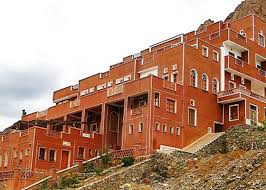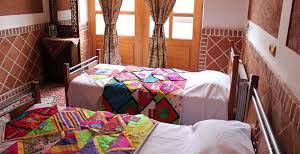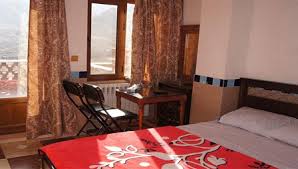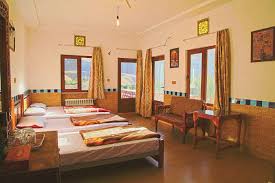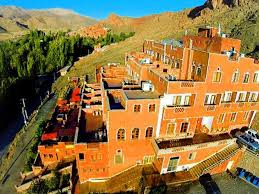Features
- Showers
- Wifi
- TV
- Common w.c
this 3-star hotels located in Abyaneh, has 30 rooms. it includes 4 floors with a traditional facade and architecture. the hotel rooms provide you with a very calm and beautiful view of the great nature of Abyaneh village
Tourist attractions of Abyaneh
- Fire temples
There had existed many Zoroastrian fire temples but unfortunately one of those has hardly survived.
"Harpak temple" a Zoroastrian temple belonging to Sasanid era is visible from almost all village spots. It was erected on a Chahartaq base with stones and Sarooj-a clay and limestone mortar- and situated in a Sabat, a roofed alley. From the lowest level, a hall has survived.
- Forts
The village has three forts which used to function as a shelter in the times of insurgencies.
"Pal Hamooneh" or "Takht-e Haman" in south west of the village was constructed 200 years ago. Its title deed still exists and every partner's share is clearly defined. "Hardeh" is located in north east of the village in Hardeh quarter. Thickness of the walls reach 1m and in height, they reach to 4-5 meters. Unlike other forts being made of red clay, this fort is made of stones too. "paleh" in north west of the village belongs to Pol quarter.
- Traditional houses
Houses mainly belong to 3 different periods of Seljuq, Safavid and Qajar. The facades mostly include white lower roofs and wooden reticulated windows. Knockers' shapes allied on the gender of who knocks the door. The right knocker is hammer-shaped for men and the right is circular for women.
Seljuq houses: These two story houses lack yards instead they have a roofed yard and a southern veranda in the height of 5 meters. Safavid houses: 4 vaulted houses, symmetry made, interior ornamentation. Qajar houses: Due to recessions no particular progress had been made.
- Traditional costumes
Here is one of rarest villages who have saved their traditional costumes. Women wear white scarves with colorful flowers. Men wear loose particular pants.
- The anthropology museum
Demonstrating the usable objects by people.
- Cemeteries
Nowadays it has 3 cemeteries, Mosalla, Cheshmeh and Posht-e Hajatgah. Triangular gravestones use symbols to define the corps lying beneath them, explaining the gender for example.
- Traditional bathrooms
The village has two traditional bathrooms one situating south and one north. The southern is not usable but the northern still fonctions.
- Husseiniehs
The village has 2 Husseiniehs which are places of pilgrimage. One sits in northern parts and the other in southern.
- Streams
There are several water streams around the village from which some are mentioned.
"Do-Abi" is the most important water resource of the village flowing in the west side. Its water is usable all year round. "Reyisoon" supplies locals with drinkable water. This stream runs in the west and it is believed to have life lengthening water. "Taardar" running in north is also known as Taardar qanat.
There are no reviews for this property yet.
Please enter the message you'd like to send to Viuna Hotel
